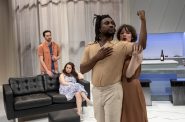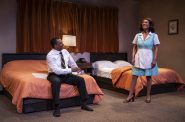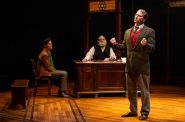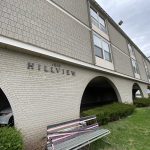Radiolab Live makes science artful at the Riverside
The little radio show from WNYC and NPR brings inventive audio and visual ponderings about how we see life to Milwaukee.

An LED light-created starscape topped off an evening of artful science with Radiolab at the Riverside Theater. Photo credit Brian Jacobson.
Radiolab Live: In the Dark, the touring production for the NPR show of the same name, took the stage at the Riverside Theatre Saturday night. It was the second to last show of the Midwest leg for Radiolab hosts Jad Abumrad and Robert Krulwich, along with the inventive and stage-necessary Pilobolus Dance Company, emcee Dave Foley and musician Thao Nguyen, and by the time you read this, the final show (at Madison’s Overture Hall) will be over and the lights will go dark. Hopefully, it won’t be the last time a touring NPR show comes to town. Radiolab was magical.
That may be a strange way to describe a show firmly founded in science (Radiolab focuses on the junction of science and philosophy), but Radiolab’s creators are able to turn science into personal stories and art. Example: When ticketholders walked in, they got a small packet containing a light-emitting diode (LED) and a flat watch battery. It was a hint to their crowdsourcing finale: a field of LED stars filling the entire hall from top to bottom, while the band played hypnotic music and Abumrad and Krulwich rested weightless, supported by the dance company. Science + Radiolab = Art.
Emcee Dave Foley (of Kids in the Hall fame), a self-professed science nerd and Radiolab fan, warmed up the crowd with stand-up and instruction. He also provided filler between the 90-minute show’s three sections, with help from Nguyen (performing without her usual band, The Get Down Stay Down) and Radiolab’s executive producers on backing instrumentation. Throughout, Pilobolus dancers performed gracefully shadow puppetry, silently interacted with Abumrad and Krulwich, acted as stagehands or simply performed willowy abstract dances. On occasion, when the modern dance company members known as Pilobolus were not acting as stage hands, performing graceful shadow-puppetry, or directly (and silently) interacting with Jad and Robert, they performed willowy abstracts reflecting each section, all based around either seeing or not seeing.
 But the show centered on Abumrad and Krulwich, who spoke on three topics based on either seeing or not seeing. The first ran down the evolution of the eye. For millions of years, lifeforms went eyeless, and even once organisms developed them it look generations to become the complex standard. Now, if one part fails, your life is diminished.
But the show centered on Abumrad and Krulwich, who spoke on three topics based on either seeing or not seeing. The first ran down the evolution of the eye. For millions of years, lifeforms went eyeless, and even once organisms developed them it look generations to become the complex standard. Now, if one part fails, your life is diminished.
That introduced the second section, an audio review of a conversation with two men who went blind in their lifetimes. The first man went blind gradually, totally so by adulthood, while the second suffered a horrible factory accident that blinded him all at once.
The schism between how each imagined his reality was perhaps the most salient and crystallizing moment of the evening. The second man visualizes or imagines everything he should be seeing, the same way we might remember something that happened on the Fourth of July. The first man refuses to live that way, instead relying on his other senses. When he is holding his infant son, there is a black space where his face would register. Instead, he knows him intimately from the way he feels, smells, and sounds.
At this moment, all the lights dimmed in the theater and everyone’s LED gadgets came out in near unison. The inner-space became outer space, with our bodies feeling weightless with the enjoyment of what was happening. It was a moment not translatable to a radio show.
Radiolab can be heard on Milwaukee’s WUWM on Fridays from 1-2 p.m. & 7-8 p.m., and again on Sundays from 10-11 p.m. To hear more about the show and how the stage presentation came about, you can read the transcript of our interview with Radiolab’s Jad Abumrad and Robert Krulwich here.
Theater
-
‘L’Appartement’ Is a Mind-Bending Comedy
 Mar 25th, 2024 by Dominique Paul Noth
Mar 25th, 2024 by Dominique Paul Noth
-
‘The Mountaintop’ Offers Very Human Martin Luther King Jr.
 Mar 11th, 2024 by Dominique Paul Noth
Mar 11th, 2024 by Dominique Paul Noth
-
‘The Chosen’ Is Subtly Powerful Drama
 Mar 10th, 2024 by Dominique Paul Noth
Mar 10th, 2024 by Dominique Paul Noth
















